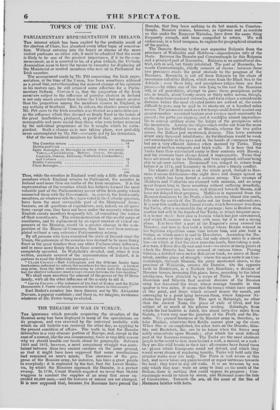PARLIAMENTARY REPRESENTATION IN IRELAND.
TOPICS OF THE DAY.
THE interest which has been excited by the probable result of the election of Clare, has absorbed every other topic of conversa- tion. 'Without entering into the hopes of alarms of the more violent partisans on either side, it must be admitted that the event is likely to be one of the greatest importance, if it be the com- mencement, as it is asserted to be, of a plan (which, the Ca‘holic Association seem to have the means to execute) for displacing all the Ministerial or neutral members who now sit in Parliament for Irish counties.
The arrangement made by Mr. Pitt concerning the Irish repre- sentation, at the time of the Union, has been sometimes adduced as a proof that, notwithstanding the avowed change of his opinions in his mature age, he still retained some affection for a Parlia- mentary Reform. Certain it is, that the proportion of the Irish members subject to the influence of popular election in Ireland is not only much greater than before the Union, but much greater than the proportion amorist the members chosen in England, to say nothin.g of Scotland. But, by others, the elective power which Mr. Pitt gave to the Irish counties was treated as a mere delusion ; as the influence which they deemed so firmly fixed in the hands of the great landholders, produced, in point of fact, members more manageable and more useful than those who were before returned by the individual proprietors of the beroughs which he extin- guished. Such a change as is now taking place, was probably never contemplated by Mr. Pitt—certainly not by his detractors.
Out of the one hundred members for Ireland,
Members
The Counties return 64 Dublin and Cork 4 Open Boroughs, or Boroughs in which there are many Voters,—Carrickfergus, Mallow, Newry, Drogheda, Limerick, Galway, Ki lkenny, Waterford, Londonderry,
and Lisburn
Dublin University 1 Close Boroughs 21
100
Thus, while the counties in England send only a fifth of the whole members which England returns to Parliament, the counties in Ireland send more than six-tenths of the Irish members. It is the representation of the counties which has hitherto formed the most valuable part of the Parliamentary power of the Irish gentry which connected them with the Government. In general, the Irish county members, on whatever side they have voted in the Catholic question, have been the most serviceable part of the Ministerial force ; because, on all questions of expenditure, and, indeed, on all ques- tions except one, they have not been under the necessity which. the English county members frequently felt, of consulting the wishes of their constituents. The entire destruction of this useful corps of auxiliaries, and its replacement by an equal number of violent op- ponents of the Ministry, would be a greater change in the com- position of the House of Commons, than has ever been contem- plated without a very exteusive Parliamentary reform. By all persons who have examined the state of Ireland since the Union, the patronage of the counties was deemed to be more firmly fixed in the great families than any other Parliamentary influence, and in none more firmly than in those-counties where it has been completely uprooted. In Wakefield's detailed, and, when it was written, accurate account of the representation of Ireland, it is curious to read the following passages :—
" CLARE Couryrv.—Earl Conyngham and the O'Brien family have freeholders sufficient to return the members for this county. A contest may arise, from the latter endeavouring to return both the members ; but the elective influence Must always remain between the two families."
We shall soon ascertain the amount of the power of the O'Brien family, with all the other influence of the county to aid it.
"LOUTH COUNTY.—The influence of the Earl of Roden and the Ris;itt Honourable J. Foster certainly commands the return in this county."
Earl Roden's member has been thrown out by Mr. Alexander Dawson, a popular candidate ; and there is, we imagine, no chance whatever of Mr. Foster being re-elected.
























 Previous page
Previous page